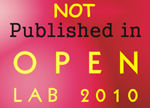Genomarketing!

You've heard of Neuromarketing, which measures the neural activity of consumers (via fMRI or EEG) in response to various products or advertisements. Now, get ready for Genomarketing! The Neuroethics & Law Blog has alerted us to a recent paper by De Neve and Fowler (2009) reporting that people with a specific low efficiency variant of the gene for monoamine oxidase A are significantly more likely to have credit card debt. Monoamine oxidase A (MAO-A) is an enzyme that breaks down the monoamine neurotransmitters (dopamine, norepinephrine, epinephrine, and serotonin). Using data from the National Longitudinal Study of Adolescent Health, the authors found in that sample of 18-26 year olds,
Having one or both MAOA alleles of the low efficiency type raises the average likelihood of having credit card debt by 7.8% and 15.9% respectively. About half of [the U.S.] population has one or both MAOA alleles of the low type. Prior research has linked this genetic variation to lack of conscientiousness, impulsivity, and addictive behavior.Is this the foreshadowing of a highly unethical marketing practice? Marketing based on MAO-A genotype, as determined from mailed-in credit card applications and payments? Credit card companies will have in-house labs to extract DNA from stamps and envelope flaps (Sinclair & McKechnie, 2000; Ng et al., 2007).1 Taking it one step further, entire marketing campaigns will be tailored to specific markers in an individual’s genome.2
Is this what it’s coming to? Not so fast. Are there any limitations in the findings of De Neve and Fowler (2009)? There are many!! The paper reported:
Allele frequency for the low grouping is 41% and high grouping is 59% in our sample. In Wave III, subjects were asked “Do you have any credit card debt?" About 41% answered in the affirmative.However, the ONLY question asked was “Do you have credit card debt?” – not how much debt or anything else. And of course, the interactions between genes and environment are immense, despite what simplistic popular media notions might lead you to believe (see Neuroanthropology for a critique). Without getting into details (which are better left to other blogs), De Neve and Fowler also note that:
Model 2 includes a number of socio-economic factors that influence financial decision-making. Income and education may in fact mediate the relationship between the genes we have identified and credit card usage.Finally, another recent paper (Beaver & Holtfreter, 2009) found that possessing the high efficiency MAO-A allele (opposite of the one discussed here) predicts involvement in fraudulent behaviors. But only if you hang around with the wrong crowd. Specifically,
Analysis of male participants from the National Longitudinal Study of Adolescent Health (J. R. Udry, 2003) revealed a statistically significant Gene × Environment interaction in which the high-MAOA activity allele increased the odds of fraudulent behaviors, but only among male participants with a high number of delinquent peers.Fraudulent behavior was determined by two questions. Can you guess them?
(1) How many times during the past 12 months have you used someone else’s credit card or bank card without their permission or knowledge?
(2) How many times during the past 12 months have you deliberately written a bad check?
Ha! Beaver and Holtfreter discuss the contrast of careful and deliberate planning [high-activity alleles] vs. impulsive violence3 [which also has a link to low-activity alleles]:
Genetic imaging research examines whether different alleles of a particular polymorphism are associated with differences in brain structure and functioning. Results have revealed that respondents possessing the low-MAOA activity alleles have limbic volume reductions, decreased cingulate activation, and hyperactivity in the amygdala and hippocampus—differences that may begin to explain the link between MAOA and violence. However, the etiologies of serious violence and fraudulent behaviors may be dissimilar. For example, engaging in fraudulent behaviors may take more time and more planning than is typical of most other antisocial behaviors, which are relatively unplanned and impulsive.Bernie Madoff vs. Phil Spector? Sort of.

Footnotes
1 This would only work, of course, for those who still conduct such business the old fashioned way. And please note that the cited references use these techniques for legitimate purposes!!
2 See also Please Complete a Genome Scan with Your Mortgage Application. EDIT: and this, too: Overspending: Blame It On Your ‘Debt Gene’?
3 Just stating the obvious here, but having credit card debt in no way, shape, or form implies that one is violent.
References
Beaver, K., & Holtfreter, K. (2009). Biosocial Influences on Fraudulent Behaviors. The Journal of Genetic Psychology, 170 (2), 101-114. DOI: 10.3200/GNTP.170.2.101-114
De Neve, Jan-Emmanuel and Fowler, James H. The MAOA Gene Predicts Credit Card Debt (August, 18 2009). Available at SSRN: http://ssrn.com/abstract=1457224
Ng LK, Ng A, Cholette F, Davis C. (2007). Optimization of recovery of human DNA from envelope flaps using DNA IQ System for STR genotyping. Forensic Sci Int Genet. 1(3-4):283-6.
Sinclair K, McKechnie VM. (2000). DNA extraction from stamps and envelope flaps using QIAamp and QIAshredder. J Forensic Sci. 45(1):229-30.
Subscribe to Post Comments [Atom]












3 Comments:
"Genomarketing"...ugh. Have you read the "Neurotrash" article yet? He's right on the mark about neuro-this and neuro-that methinks, but a lot of harshness on other things.
I did see the "Neurotrash" article. Rather ill-humored, eh? He makes some good points, yeah, but then he takes it to ridiculous extremes:
The plea “My brain made me do it” would essentially be that of “the Big Bang made me do it”.
However, the brains of some unfortunate individuals with paranoid schizophrenia do "tell" them to drown their children or behead a passenger on the bus.
Anyway. I always thought "Neurotrash" would be a great name for a neuroscience gossip and trash-talking blog.
Raymond Tallis may want to reconsider his opinion on the causality of brain states after he gets a stroke that leaves him completely blind (for example).
The neuro-this and neuro-that is a fad, hyped by many scientific and popular journals. But it's not different from other fads. The social-this and social-that is another recent one. Trashing fads is fine, but one should not get confused with the legitimate research also going on and throw everything away.
Eventually, with enough rigorous research, we will find brain states for pretty much anything we do. Obviously, it's going to be a problem for the legal system and for the notion of personal responsibility.
Post a Comment
<< Home